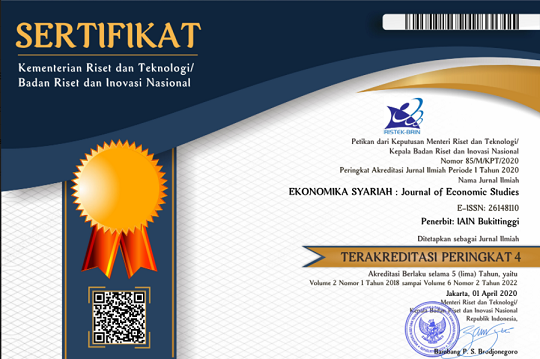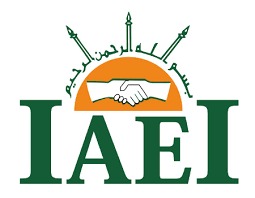Young Muslim Consumer Behavior on Digital Platform: What can be Learned for Developing Halal Product?
DOI:
https://doi.org/10.30983/es.v7i2.7576Keywords:
consumer behavior, theory of planned behavior, halal productAbstract
Indonesia memiliki peluang besar dalam pengembangan produk halal dan merupakan negara dengan konsumsi online terbesar di Asia. Penelitian ini bertujuan untuk mengobservasi perilaku konsumsi generasi muda muslim Indonesia pada platform digital. Penelitian berkaitan dengan perilaku konsumsi pada platform digital telah menunjukkan hasil yang cukup signifikan, namun akademisi dan praktisi yang peduli dalam pengembangan produk halal masih sedikit. Sehingga penting untuk memahami perilaku konsumen agar dapat menyasar konsumen yang tepat. Penelitian ini dikembangkan berdasarkan Theory of Planned Behavior serta memanfaatkan data primer yang diperoleh melalui kuesioner. Â Sebanyak 155 responden generasi muda muslim dipilih melalui teknik accidental sampling dan dianalisis menggunakan SEM-PLS. Hasil penelitian menunjukkan bahwa perilaku konsumen pada platform digital dipengaruhi oleh Attitude, Perceived behavior control, Recreation orientation, dan Promotion. Sementara itu, subjective norm, Religiosity dan Perceived Benefit merupakan alasan sekunder yang membuat mereka memilih platform digital. Hasil statistik ini menunjukkan bahwa konsumen di era digital sangat sensitif terhadap harga yang lebih murah. Selain itu, berbagai layanan tambahan yang disediakan oleh platform digital seperti pembayaran di tempat (COD) memudahkan mereka untuk memenuhi kebutuhan konsumsinya. Oleh karena itu, berdasarkan temuan tersebut, penting bagi produk halal untuk mengembangkan platform digital yang mampu memberikan layanan tambahan yang berguna untuk meningkatkan kenyamanan dan kepuasan pelanggan.
Indonesia have great opportunity for halal product developments and the largest online consumption in asia. This study aims to observe the consumption behavior of young muslim through digital platforms. Research related to consumer behavior has revealed a significant result on digital platform, however the academics and practitioners who are concerned in the halal product development are few. Therefore, it is important to understand consumer behavior in targeting the right consumers. This research is developed based on theory of planned behavior and used primary data obtained through questionnaire. 155 young muslim respondents selected with accidental sampling techniques and analyzed using partial least squares structural equation modeling as the data processing tools. The results show that consumer behavior in digital platforms is influenced by Attitude, Perceived behavior control, Recreation orientation, and Promotion. Meanwhile, subjective norm, Religiosity and Perceived Benefit are secondary reasons they choose digital platforms. This statistical results explain that the consumers in the digital era are sensitive to lower price. In addition, various supplementary services provided by digital platforms such as paylater payments make it easy for them to satisfy their consumption. Therefore, based on the findings, it is important for halal products to develop a digital platform that is able to provide useful supplementary services to increase customer convenience and satisfaction.
References
Ab Rashid, N., & Bojei, J. (2019). The relationship between halal traceability system adoption and environmental factors on halal food supply chain integrity in Malaysia. Journal of Islamic Marketing, 11(1), 117–142. https://doi.org/10.1108/JIMA-01-2018-0016
Afendi, A. (2020). The effect of halal certification, halal awareness and product knowledge on purchase decisions for halal fashion products. Journal of Digital Marketing and Halal Industry, 2(2), 145. https://doi.org/10.21580/jdmhi.2020.2.2.6160
Akram, U., Hui, P., Khan, M. K., Hashim, M., Qiu, Y., & Zhang, Y. (2018). Online impulse buying on “double eleven†shopping festival: An empirical investigation of utilitarian and hedonic motivations. In J. Xu, M. Gen, A. Hajiyev, & F. L. Cooke (Eds.), Proceedings of the Eleventh International Conference on Management Science and Engineering Management (pp. 680–692). Springer International Publishing. https://doi.org/10.1007/978-3-319-59280-0_56
Amoako, G. K., Dzogbenuku, R. K., & Abubakari, A. (2020). Do green knowledge and attitude influence the youth’s green purchasing? Theory of planned behavior. International Journal of Productivity and Performance Management, 69(8), 1609–1626. https://doi.org/10.1108/IJPPM-12-2019-0595
Chen, C., & Li, X. (2020). The effect of online shopping festival promotion strategies on consumer participation intention. Industrial Management & Data Systems, 120(12), 2375–2395. https://doi.org/10.1108/IMDS-11-2019-0628
Croes, E., & Bartels, J. (2021). Young adults’ motivations for following social influencers and their relationship to identification and buying behavior. Computers in Human Behavior, 124, 106910. https://doi.org/10.1016/j.chb.2021.106910
Daduk Merdika, Yevis Marty OESMAN, Erni Tisnawati SULE, Nurul CHAMIDAH, Dwi KARTINI, & Aditya Halim Perdana Kusuma Putra. (2019). Moderating of the role of technology theory to the existence of consumer behavior on e-commerce. Journal of Distribution Science, 17(7), 15–25. https://doi.org/10.15722/JDS.17.7.201907.15
Felix, S., & Tessa, H. (2022). Theory of planned behavior influences online shopping behavior. ATM, 6(1).
German Ruiz-Herrera, L., Valencia-Arias, A., Gallegos, A., Benjumea-Arias, M., & Flores-Siapo, E. (2023). Technology acceptance factors of e-commerce among young people: An integration of the technology acceptance model and theory of planned behavior. Heliyon, 9(6), e16418. https://doi.org/10.1016/j.heliyon.2023.e16418
Gunawan, C. M., Rahmania, L., & Kenang, I. H. (2023). The influence of social influence and peer influence on intention to purchase in e-commerce. Review of Management and Entrepreneurship, 7(1), 61–84. https://doi.org/10.37715/rme.v7i1.3683
Hasna N. Khoirunnisa & Sumadi. (2023). Determination of attitude using games and purchase intentions in e-commerce. Jurnal Manajemen, 27(1), 103–123. https://doi.org/10.24912/jm.v27i1.1035
Iranmanesh, M., Mirzaei, M., Parvin Hosseini, S. M., & Zailani, S. (2019). Muslims’ willingness to pay for certified halal food: An extension of the theory of planned behaviour. Journal of Islamic Marketing, 11(1), 14–30. https://doi.org/10.1108/JIMA-03-2018-0049
Julio, E. N., Wahab, Z., Widiyanti, M., & Shihab, M. S. (2021). The Influence of Knowledge and Attitude as Consumer Behavior on Product Purchase Interest on Lazada E-Commerce. International Research Journal of Management, IT & Social Sciences, 8(4).
Kang, H., Hahn, M., Fortin, D. R., Hyun, Y. J., & Eom, Y. (2006). Effects of perceived behavioral control on the consumer usage intention of e-coupons. Psychology and Marketing, 23(10), 841–864. https://doi.org/10.1002/mar.20136
Khalid, Aya, Ali, Khaled, & Ahmad. (2020). Impact of halal digital marketing on consumer behavior: Jordan’s perspective. International Journal of Economics and Business Administration, VIII(Special Issue 1), 202–215. https://doi.org/10.35808/ijeba/537
Mainardes, E. W., Souza, I. M. de, & Correia, R. D. (2020). Antecedents and consequents of consumers not adopting e-commerce. Journal of Retailing and Consumer Services, 55, 102138. https://doi.org/10.1016/j.jretconser.2020.102138
Mittal, A. (2013). E-commerce: It’s impact on consumer behavior. Global Journal of Management and Business Studies, 3(2), 131–138.
Moshrefjavadi, M. H., Rezaie Dolatabadi, H., Nourbakhsh, M., Poursaeedi, A., & Asadollahi, A. (2012). An analysis of factors affecting on online shopping behavior of consumers. International Journal of Marketing Studies, 4(5), p81. https://doi.org/10.5539/ijms.v4n5p81
Naseri, R. N. N., Esa, M. M., Abas, N., Ahmad, N. Z. A., Azis, R. A., & Nordin, M. N. bin. (2021). An overview of online purchase intention of halal cosmetic product: A perspective from Malaysia. Turkish Journal of Computer and Mathematics Education, 12(10), 7674–7681.
Nurchayati, N., Widayati, T., Sulistiyani, S., Nurchayati, N., & Suprapti, S. (2023). Antecedents of user attitude towards e-commerce and future purchase intention. International Journal of Data and Network Science, 7(1), 505–512. https://doi.org/10.5267/j.ijdns.2022.8.007
Purwanto, A., Haque, M. G., Sunarsih, D., & Asbari, M. (2021). The role of brand image, food safety, awareness, certification on halal food purchase intention: An empirical study on Indonesian consumers. Journal of Industrial Engineering, 2(3), 42–52. https://doi.org/10.7777/jiemar.v2i3
Rita, P., & Ramos, R. F. (2022). Global research trends in consumer behavior and sustainability in e-commerce: A bibliometric analysis of the knowledge structure. Sustainability, 14(15), 9455. https://doi.org/10.3390/su14159455
Sari, D. P., Jaswir, I., & Bin Haji Che Daud, Mohd. R. (2021). Factors Affecting the successful implementation of MS1500 by Malaysian halal food industry. International Journal of Halal Research, 3(2), 102–112. https://doi.org/10.18517/ijhr.3.2.102-112.2021
Sembada, A. Y., & Koay, K. Y. (2021). How perceived behavioral control affects trust to purchase in social media stores. Journal of Business Research, 130, 574–582. https://doi.org/10.1016/j.jbusres.2019.09.028
Shah, S. A., Azhar, S. M., & Bhutto, N. A. (2019). Halal marketing: A marketing strategy perspective. Journal of Islamic Marketing, 11(6), 1641–1655. https://doi.org/10.1108/JIMA-11-2018-0211
Shen, Z. (2023). Mining sustainable fashion e-commerce: Social media texts and consumer behaviors. Electronic Commerce Research, 23(2), 949–971. https://doi.org/10.1007/s10660-021-094985
Silalahi, S. A. F., Fachrurazi, F., & Fahham, A. M. (2022). Factors affecting intention to adopt halal practices: Case study of Indonesian small and medium enterprises. Journal of Islamic Marketing, 13(6), 1244–1263. https://doi.org/10.1108/JIMA-05-2020-0152
SivaKumar, A. (2017). An empirical study on the factors affecting online shopping behavior of millennial consumers. Journal of Internet Commerce.
Suleman, S., Sibghatullah, A., & Azam, M. (2021). Religiosity, halal food consumption, and physical well-being: An extension of the TPB. Cogent Business & Management, 8(1), 1860385. https://doi.org/10.1080/23311975.2020.1860385
Vanany, I., Soon, J. M., Maryani, A., & Wibawa, B. M. (2019). Determinants of halal-food consumption in Indonesia. Journal of Islamic Marketing, 11(2), 507–521. https://doi.org/10.1108/JIMA-09-2018-0177
Vizano, N. A., Khamaludin, K., & Fahlevi, M. (2021). The effect of halal awareness on purchase intention of halal food: A case study in Indonesia. The Journal of Asian Finance, Economics and Business, 8(4), 441–453. https://doi.org/10.13106/JAFEB.2021.VOL8.NO4.0441
Yang, S., Lei, L., & Jiemin, Z. (2018). Understanding consumers sustainable consumption intention at china’s double-11 online shopping festival: An extended theory of planned behavior model. Sustainability, 1–19.
Yulianto, Y., Sisko, A., & Hendriana, E. (2021). The stimulus of impulse buying behavior on e-commerce shopping festival: A moderated-mediated analysis. Journal of Business and Management Review, 2(10), 692–714. https://doi.org/10.47153/jbmr210.2152021
Zheng, X., Men, J., Yang, F., & Gong, X. (2019). Understanding impulse buying in mobile commerce: An investigation into hedonic and utilitarian browsing. International Journal of Information Management, 48, 151–160. https://doi.org/10.1016/j.ijinfomgt.2019.02.010
Downloads
Published
How to Cite
Issue
Section
Citation Check
License
Copyright (c) 2024 Irma Yuliani, Muhammad Amin, Ravika Mutiara Savitrah

This work is licensed under a Creative Commons Attribution-ShareAlike 4.0 International License.
Authors who publish with this journal agree to the following terms:
- Authors retain copyright and grant the journal right of first publication with the work simultaneously licensed under a Creative Commons Attribution-ShareAlike 4.0 International License that allows others to share the work with an acknowledgment of the work's authorship and initial publication in this journal.
- Authors are able to enter into separate, additional contractual arrangements for the non-exclusive distribution of the journal's published version of the work (e.g., post it to an institutional repository or publish it in a book), with an acknowledgment of its initial publication in this journal.
- Authors are permitted and encouraged to post their work online (e.g., in institutional repositories or on their website) prior to and during the submission process, as it can lead to productive exchanges, as well as earlier and greater citation of published work (See The Effect of Open Access).




